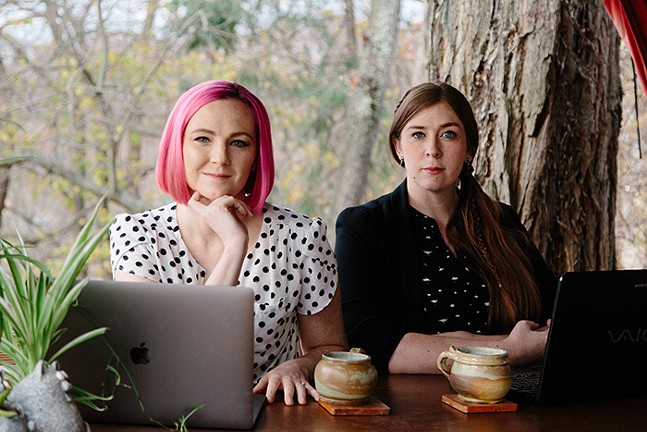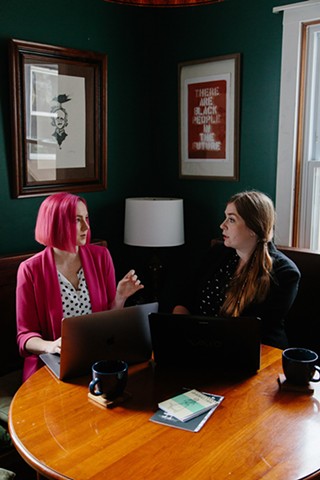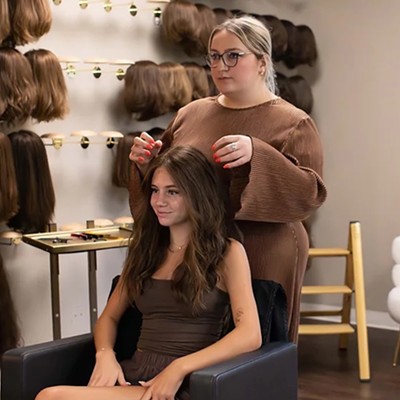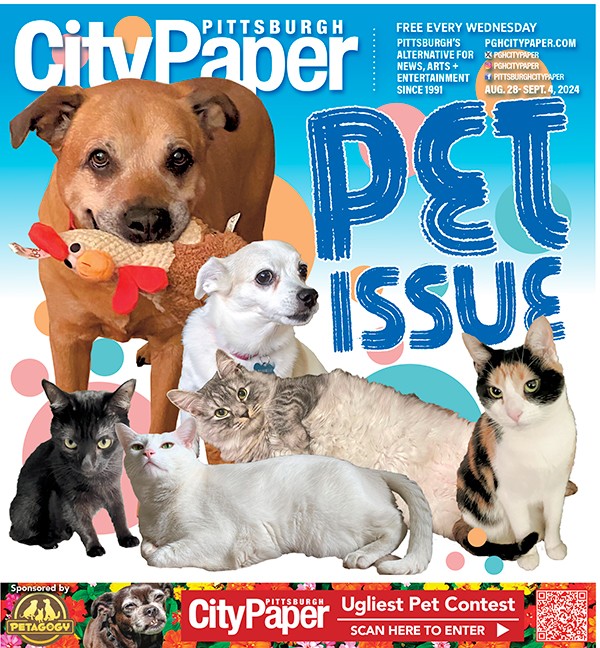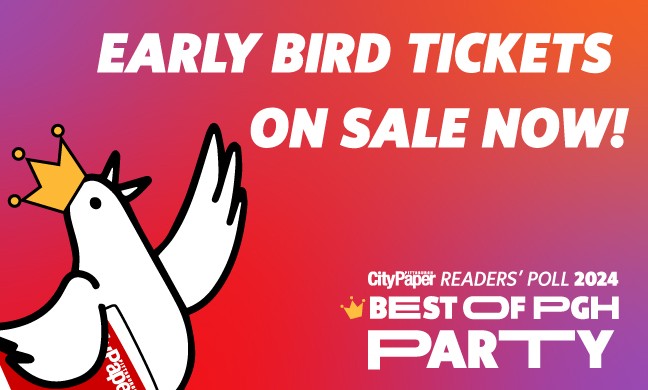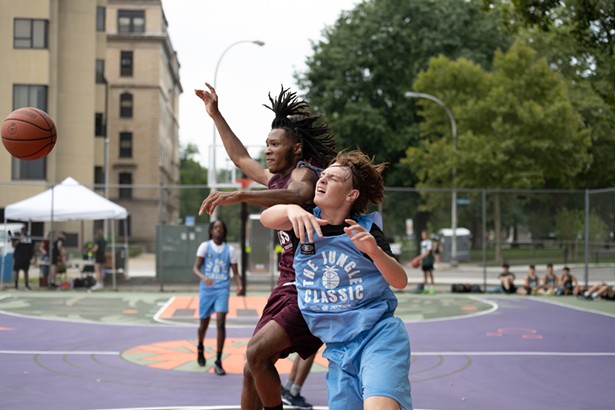Workhorse Collaborative wants to promote your arts organization or nonprofit
[
{
"name": "Local Action Unit",
"component": "24929589",
"insertPoint": "3",
"requiredCountToDisplay": "1"
}
]
Compared to many groups, arts nonprofits and organizations face more difficulties finding the time and money to dedicate to marketing and communications. Emily Willson and Jackie Baker, the co-founders of Workhorse Collaborative, a local boutique consulting firm specializing in arts marketing and organizational strategy for the arts, are more than aware of these challenges.
The two women have an extensive background in working for arts nonprofits, most recently for the immersive theater company Bricolage. After being excused from their positions there in the spring, they decided to embark on creating a company that would combine their knowledge and experience to help local arts professionals promote themselves.
“We pretty much do it all,” says Willson, who, in addition to being the head of marketing for four years at Bricolage, also worked with the Carnegie Museum of Art.
She explains that their services range from helping on a project-by-project basis to creating a long-term marketing strategy that better communicates an organization's mission and goals. Clients can also decide if Workhorse will take on the bulk of the work, such as creating social media posts and marketing materials, or if they will implement a plan in-house, using their own staff.
“A lot of our clients come to us sometimes not even knowing exactly what they need,” says Willson. “We sit down with them and figure out how can we best help you.”
Since launching in August, the company has started working with local organizations like the arts market Handmade Arcade and the Kelly Strayhorn Theater (KST) community performance space in East Liberty, as well as individual artists.
Baker, who was the managing director of Bricolage and, prior to that, development manager at KST, says the ability to be flexible benefits many clients, especially in the midst of the COVID-19 pandemic. She adds that, in her experience, theaters and other spaces used to creating their performance seasons ahead of time, often years in advance, are now uncertain how to proceed as the pandemic drags on and live events have to remain canceled.
She says the situation has forced arts organizations and nonprofits to be “more short-sighted and more immediate,” and to react quickly should something fall through.
“It's much more focused on what we do over the next three months as opposed to the next three years,” says Baker.
It has also made them realize the importance of digital advertising, something Baker believes had been ignored for too long prior to the pandemic.
“This is a new territory for many folks, especially arts organizations who often have print-heavy budgets for marketing,” says Baker, adding that Workhorse is equipped to help clients build a digital marketing strategy. “Their old tricks weren't going to be effective in this climate.”
Willson says that, as opposed to a business, arts marketing is different, as it focuses more on communicating a mission than trying to generate sales or make money.
“It's a little more nuanced, and, for me, it's a lot more exciting and more interesting,” says Willson. “Marketing and advertising can feel a little like you're trying to convince someone or being manipulative, but when you're doing it for an organization that's trying to improve the world, it feels a lot better.”
Baker gives an example of this by describing how Workhorse has been working with KST executive director Joseph Hall to develop an organizational strategy.
“It’s resulted in us exploring with him what it means to be an anti-racist organization and how to challenge traditional hierarchies in work environments together — ultimately moving toward a collaborative work model, not just in theory but in structure of the organization itself,” says Baker.
Willson points out that because they depend on grant money or other philanthropic funding, arts nonprofits have a limited budget with which to work.
“With arts organizations and nonprofits, the main factor I usually find is budget,” says Willson. “They just have a much smaller budget and have to be extremely strategic with where and how they're spending that money.”
Workhorse accommodates this by offering free, 30-minute consultations to see if they're a good fit, not having set fees, and basing rates on a project-by-project basis, as well as allowing clients more time to pay.
While the COVID-19 pandemic has put everyone in a difficult position, Baker hopes Workhorse can be part of helping Pittsburgh arts groups and individuals keep going and prepare for life after the crisis.
“I wonder how they will learn from this and find ways to become more nimble and adaptive past COVID-19,” says Baker. “For all the things that are scary and uncertain about this time, there is always this really interesting and exciting opportunity for a rebirth after something like this, to come back in a strong, more resilient way.”
The two women have an extensive background in working for arts nonprofits, most recently for the immersive theater company Bricolage. After being excused from their positions there in the spring, they decided to embark on creating a company that would combine their knowledge and experience to help local arts professionals promote themselves.
“We pretty much do it all,” says Willson, who, in addition to being the head of marketing for four years at Bricolage, also worked with the Carnegie Museum of Art.
She explains that their services range from helping on a project-by-project basis to creating a long-term marketing strategy that better communicates an organization's mission and goals. Clients can also decide if Workhorse will take on the bulk of the work, such as creating social media posts and marketing materials, or if they will implement a plan in-house, using their own staff.
“A lot of our clients come to us sometimes not even knowing exactly what they need,” says Willson. “We sit down with them and figure out how can we best help you.”
Since launching in August, the company has started working with local organizations like the arts market Handmade Arcade and the Kelly Strayhorn Theater (KST) community performance space in East Liberty, as well as individual artists.
Baker, who was the managing director of Bricolage and, prior to that, development manager at KST, says the ability to be flexible benefits many clients, especially in the midst of the COVID-19 pandemic. She adds that, in her experience, theaters and other spaces used to creating their performance seasons ahead of time, often years in advance, are now uncertain how to proceed as the pandemic drags on and live events have to remain canceled.
She says the situation has forced arts organizations and nonprofits to be “more short-sighted and more immediate,” and to react quickly should something fall through.
“It's much more focused on what we do over the next three months as opposed to the next three years,” says Baker.
It has also made them realize the importance of digital advertising, something Baker believes had been ignored for too long prior to the pandemic.
“This is a new territory for many folks, especially arts organizations who often have print-heavy budgets for marketing,” says Baker, adding that Workhorse is equipped to help clients build a digital marketing strategy. “Their old tricks weren't going to be effective in this climate.”
Willson says that, as opposed to a business, arts marketing is different, as it focuses more on communicating a mission than trying to generate sales or make money.
“It's a little more nuanced, and, for me, it's a lot more exciting and more interesting,” says Willson. “Marketing and advertising can feel a little like you're trying to convince someone or being manipulative, but when you're doing it for an organization that's trying to improve the world, it feels a lot better.”
Baker gives an example of this by describing how Workhorse has been working with KST executive director Joseph Hall to develop an organizational strategy.
“It’s resulted in us exploring with him what it means to be an anti-racist organization and how to challenge traditional hierarchies in work environments together — ultimately moving toward a collaborative work model, not just in theory but in structure of the organization itself,” says Baker.
Willson points out that because they depend on grant money or other philanthropic funding, arts nonprofits have a limited budget with which to work.
“With arts organizations and nonprofits, the main factor I usually find is budget,” says Willson. “They just have a much smaller budget and have to be extremely strategic with where and how they're spending that money.”
Workhorse accommodates this by offering free, 30-minute consultations to see if they're a good fit, not having set fees, and basing rates on a project-by-project basis, as well as allowing clients more time to pay.
While the COVID-19 pandemic has put everyone in a difficult position, Baker hopes Workhorse can be part of helping Pittsburgh arts groups and individuals keep going and prepare for life after the crisis.
“I wonder how they will learn from this and find ways to become more nimble and adaptive past COVID-19,” says Baker. “For all the things that are scary and uncertain about this time, there is always this really interesting and exciting opportunity for a rebirth after something like this, to come back in a strong, more resilient way.”

